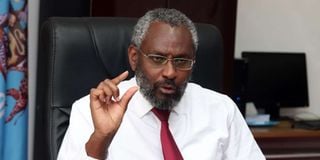Premium
Seek other funding ways, varsities told

University of Nairobi Vice-Chancellor Prof Stephen Gitahi Kiama during the interview at his office in Nairobi on October 1, 2020.
The Treasury has directed the Ministry of Education to convene an urgent meeting with public universities and university colleges and come up with ways of addressing financial challenges facing the institutions.
Treasury Cabinet Secretary Ukur Yatani said the government has no additional money to send to the learning institutions and asked them to find alternative funding.
In a letter to his Education colleague George Magoha, the Treasury CS said the ministry should move with speed in coming up with sustainable and affordable policy options to help the university address their financial challenges.
“In view of the need to come up with sustainable solutions to the problems facing universities and university colleges, the ministry has been advised to come up with policy recommendations that will address the existing problems once and for all,” the letter by Mr Yatani says.
The proposals from the National Treasury to the Ministry of Education include rationalising workers, especially non-teaching staff, a review of fees and charges paid by students and reviewing the policy of placement of government-sponsored students in private universities.
The Treasury also wants universities to consider restructuring, with a view of closing and merging non-viable campuses, liquidating redundant assets and starting income-generating activities to avoid relying on the exchequer.
Mr Yatani asked the Education Ministry to consider the differentiated unit cost criterion which is used to determine the amount allocated to universities.
Public universities have been struggling to stay financially afloat since 2016.
The University of Nairobi and Kenyatta have already begun restructuring.
Just last week, Moi University issued a circular of planned restructuring, which could lead to massive job losses.
Public university vice-chancellors and MPs are vehemently opposed to the sending of government-sponsored students to private learning institutions.
The VCs insist public universities have the capacity to accommodate all government-sponsored students.
The drive to reverse the policy has not been successful.
According to data from the Ministry of Education, the number of students placed in private universities stands at 86,270 (15 per cent) compared to 492,200 (85 per cent) sent to public universities.
The Kenya Universities and Colleges Central Placement Service (Kuccps) did not release information on government-sponsored students sent to private universities in the recent placement.
Budgetary allocation to private universities stands at Sh2.4 billion while public ones get Sh41 billion.
In the 2022/23 financial year budget, the Treasury set aside Sh91.2 billion for public universities instead of the Sh102.807 billion the institutions had suggested to enable them settle bills, salaries and sustain themselves.
The institutions received Sh76.3 billion in the 2021/22 fiscal year.
Prof Magoha wrote to the Treasury on April 13 seeking for additional university funding.
The CS said public universities are struggling financially and cannot run their programmes smoothly.
University of Nairobi Vice-Chancellor Stephen Kiama wrote to the Treasury seeking additional Sh607.8 million.
Prof Magoha asked for additional Sh13.26 billion to cater for government sponsored students at Uzima University and settlement of Uon statutory payments.





